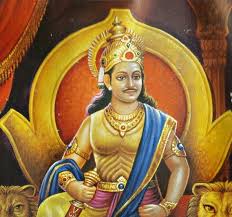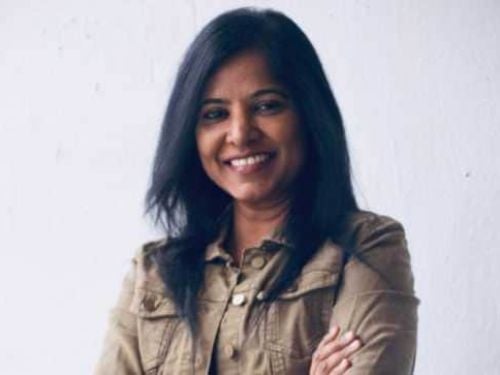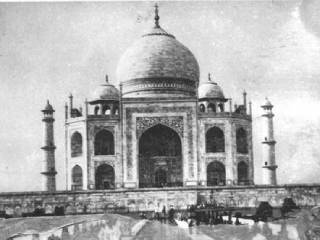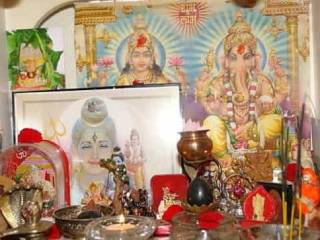
Once upon a time Hindus had power: emperors like Chandragupta, who was advised by the remarkable Chanakya, or Kautilya, possessed territories so vast, that they extended from Karnataka till the present day Afghanistan. His soldiers were feared by enemies – in fact, contrary to what western history books tell us, Alexander the Great, who had the most powerful army of this time, encountered tremendous resistance in India and had to retreat, dying from his wounds on the way back to Greece. Yet, Hindu power had discrimination: battles were only fought between kshatriyas, during the daytime and the crops and lives of farmers were never touched. Hindu power could also be ‘soft’: contrary to Christianity and Islam, Hindus never sought to impose militarily their religion and way of life to other nations. Yet, Hinduism went peacefully towards the East and can still be seen today in Bali, Laos or Cambodia, witness Angkor Vat; and towards the West, where it had a great influence on the Greek and Celt philosophy and religion. It should be noted that Hindus, during the centuries to come, gave refuge to all the persecuted religious minorities of the world, from the Jews to the Parsis, from the Christian Syrians to the Tibetans today.
The administration that Chanakya and Chandragupta established, was so remarkable that it was later used by the Mughals and the British with little modifications. Many more great Hindu civilisations then rose-up: in the South, for instance, the Pallavas of king Simhavishnu conquered Ceylon, as well as annexing the Chera, Cholas & Pandya kingdoms. We owe them the superb sculpted temples of Mahabalipuram and powerful cities such as Kanchpuram. Under their rule, Sanskrit went through a revival period and the mandapam technique of temples flowered like never before, as did the Bhakti movement, which gave a fresh dynamism to Hinduism. In the Centre of India, the Vardhamana dynasty of king Harsha, added Bengal and Orissa, to an already powerful empire that included today’s UP, Bihar, and even spread northwards towards Nepal and Kashmir. French historian Alain Danielou wrote « that King Harsha symbolised all that was right in Hindu monarchy, wielding an absolute power, but each sphere of administration was enjoying a large autonomy and the villages were functioning like small republics.
Even after successive centuries of violent Arabs invasions, Portuguese and Chinese travellers still marvelled at the land of ‘milk and honey’ that India was, where practically ‘no beggars could be seen’. The last great Hindu Empire was that of Vijayanagar, where the kings also ruled in a dharmic manner and provided justice, education to all, freedom of religion and the flowering of art and culture. Historians tell us that the sacking of Vijayanagar was one of the most bloody ever in the history of India: rivers ran red with bloods for days, ten of thousands of Hindus were brutally killed, the looting went for six months, all the statues had their noses and ears chopped and every Muslim soldier went back to his land with a bounty of gold, horses, women and slaves…
Hindu power then vanished for nearly 450 years. The British, who rightly understood that Hindus were the principal obstacle to their colonising the land and the minds of India, further undermined Hindu power by dividing India on the lines of religion and castes, a legacy that lingers even after Independence, and shaping-up in Cambridge and Oxford an elite class of Indians who today still think and act British. In 1947, Nehru who had already embraced the British idea of socialism, saw to it that Hindus still be denied any form of power, by promoting other religions, erasing from history books most traces of Hindu greatness, taking over Hindu temples, and restraining the few Indian Hindu nationalists, whom he had to admit to his govt, such as the no-nonsense Sardar Patel.
In the year 2000, Hindus at last came back to power, when Atal Bihari Vajpayee was elected Prime Minister of India. Hindus had great hope in him, but Mr Vajpayee, in true Hindu tradition, showed lack of insight, by giving orders to leave Sonia Gandhi alone and driving to Lahore in a ‘peace bus’, while Pakistani President Musharraf was sending his disguised soldiers to take over the Kargil hills. The BJP was also complacent, thinking that the little bit economic progress they brought to India, would be enough to win the next elections. But he Congress was re-elected for ten years and Mrs Gandhi, far from being grateful, mercilessly went all out after the BJP and Narendra Modi. And once more, Hindu power was snatched away.

Then Mr Narendra Modi appeared on the scene: he was a remarkable chief minister of Gujarat, making his state the most prosperous in India, the least corrupt, the greenest and the only one where ministers actually worked for the people – instead of for themselves or their parties. Many did not forgive him for not calling the army immediately after the anti-Muslim riots, triggered by the burning of Hindu pilgrims in the Sabarmati train, but that did not stop him from positioning himself as a prime ministerial candidate.
More than even Mr Vajpayee, Mr Modi became Prime Minister of India in 2014 on a united Hindu vote, from the Dalits to the Brahmins. Hindus voted Mr Narendra Modi to power, because he pledged many things that they had been yearning for a long time: a Common Civil Code, the removal of article 370, or the building of the Ram temple in Ayodhya. They also liked the fact that Mr Modi was a fiery Hindu, so different from Mr Vajpayee: he called a spade a spade, was not afraid of naming his enemies and was a passionate and eloquent orator. Mr Modi thus became Prime Minister of India with a huge majority, and all Hindus hoped that power had come back to them after 5 centuries, for at least several generations.
Mr Modi, has done an outstanding job in the two and half years since he came to power: he has initiated economic reforms, such as pushing through the much needed GST bill, inaugurated a Clean India movement which is absolutely indispensable, given the present state, restored some of India’s international reputation by making a number of visits abroad and tried to streamline the bloated Indian bureaucracy. Yet, we now notice on the Social Media, specially after the Uri attack, a certain uneasiness on the part of some of those who voted for him, because they don’t recognize the outspoken, no-nonsense, tough Gujarat CM, in Modi the Prime Minister of India. They understand that as the leader of all Indians, Mr Modi has to rise above partisanship, but they also realize that there isn’t really at the moment a true re-establishing of Hindu power, as temples continue to be under government rule, Indians still cannot buy land or open businesses in Kashmir, while Muslim Kashmiris are selling everywhere in India their carpets and shawls, the Chinese continue to bully India, even blocking its access to the nuclear club (NSG) and Kashmir is getting out of control, after the unfortunate alliance with the PDP.
Now, why is it that some Hindus feel that Mr Modi may have lost touch with what they expected – rightly so, as they elected him ? They answer is simple: Delhi! Delhi is a big bubble, plonked all the way up in the North, far from the South, even the Center of India where everything is decided, often in an a arbitrary manner, where journalists, politicians, diplomats, huddle together in seminars, parties and embassy cocktails, repeating the same clichés, which in turn are taken-up by foreign correspondents: secularism, ‘Hindu fundamentalism’ or the eternal obsession of all Indologists – for India’s caste problems (whereas since Independence, if there is one thing that the Indian Congress did, it is to have worked hard on promoting lower castes, and that quite successfully). Furthermore, while in Gujarat Mr Modi, was in the Center of India, and made himself available to contacts, meeting many people from all walks of life, in Delhi, he is surrounded by a quadruple layer of security, innumerable PA’s, PS’s, high bureaucrats, ministers, which is all a Congress legacy, a straightjacket that he, and his ministers are trapped into, even if it is against their will.
Thus, he may not know anymore, what the common people, who brought him to power, really think and wish. He may also err into believing that hobnobbing with Barack Obama, the Chinese president, or Angela Merkel, is going to win him back the votes of the millions of Hindus who have elected him. Neither will the economic progress that India will undoubtedly make in five years under his vigilant rule, as Mr Vajpayee has demonstrated before. Mr Modi, may also be making a mistake by thinking that sending his External Affairs minister to the canonisation of Mother Teresa will earn him the Christian votes in India or that meeting Amir Khan, who signed numerous petitions against him after Godhra, will win him Muslim votes. It is clear after the five years in power of Mr Vajpayee, who went all out to woo the Media, with his (nice) Friday man Suddeendhra Kulkarni, that neither the Indian intelligentsia, nor the Muslims, nor the Christians will ever vote for the BJP.
Right: Mr Modi may think that he will take all the hard decisions, such as the removal of the article 370, during his second term, when he has a majority in the Raja Sabha. But the question is: will the Hindu united vote that carried him to power in 2014, repeat itself in 2019 ? This is doubtful – and we may witness in 2019 an anti-incumbency result, that could see the return of the Congress to Government and an end – at least for a long time – of Hindu power. For whatever its faults, the Congress knows how to wield power. Though most of its members are Hindus, it does not have any Hindu goody-goodiness or feeling of guilt, about being ruthless, cynical, and using any means, however unethical, to reach its goals.
Many on Twitter or Facebook have expressed the view that Mr Narendra Modi is the best chance for Hindu power that has happened in centuries and that he cannot misuse it. In the next two and half years, that are remaining with him, the Prime Minister needs thus to please his Hindu electorate, in the same way the Congress has shown that it always pleases its own traditional Muslim and Christian voters. There has to be some hard decisions, that are mid-way to those he pledged before being elected, such as removing the perks, travel expenses and Z security for the Kashmiris separatist leaders. Hindus do not understand, especially after the Uri killings, why hundreds of crores of their tax money are spent on those men who advocate a violent separation from India. Mrs Sonia Gandhi had for ten years an Advisory Board, and in this way she was able to get some feel about what the people of India desired. Why did Mr Modi refuse the same proposal that was put up in front of him, so that every month he could listen to the opinions of a rotating board of twelve representatives of Indians from business, religious, societal, or cultural spheres? That would be one way that he gets opinions different to those he receives from his own cabinet, high bureaucrats and entourage who often give “yes ministers” opinions in true Bhakti tradition. Mr Modi, while keeping a certain imperial aloofness, needs too to show a tougher image than the one he is projecting now – versus the Chinese for instance that are still claiming huge chunks of Indian territory, built a road between Sinkiang and Pakistan, and are surrounding India from all sides, from Nepal to Burma, from Sri Lanka to Pakistan. Hindus need to be protected: India is the only country in the world where Indians have become refugees in their own country – remember the 400.000 Hindus of the Valley of Kashmir, who where chased out of their ancestral lands and houses by violence. Hindus are also persecuted in Pakistan, Bangladesh, or even Fiji and require support. As one tweeter said: “we need a Putin of India not a second Vajpayee”.
Hindu power, however, will always be compassionate: Hindu men and women are still today the only people in the world who recognise that God may manifest Himself or Herself at different times, using different names, and different scriptures. This is why a Hindu is still capable of worshipping not only in his own temple, but also to enter in a Christian church or a Muslim mosque, and that with respect and devotion. The reverse is not true. This is the last Knowledge that can save the world from the self-destructing path it has embarked upon: what happens after you die, what is karma, what is dharma, what is an avatar and how the soul, which is God’s spark in you, reincarnates itself from life to life. Mr Narendra Modi was elected to protect this Knowledge and he cannot fail this task. In today’s world, it is necessary, to have not only economic, but also military and even nuclear power, otherwise, as China showed, a nation doesn’t earn any respect. And today India is not respected the way it should, considering that contrary to China, it remains a vibrant democracy, whatever its flaws. Mr Modi thus needs to flex his muscles, while retaining the qualities of all Hindus, which is compassion and love.
Otherwise, the mistake of Pritharivaj Chauhan will be repeated. Remember the battle of Tarain in 1191: Prithviraj’s cavalry charged and routed the Muslims and captured Muhammad Ghori. Ghori begged for his life & Prithviraj allowed him to go, despite his generals telling him not to do so. And sure enough, Ghori came back in 1192 and knowing that Rajputs did not fight in the night, attacked in the early morning hours when Prithviraj and his army were sleeping and thus was able to win this one battle. 40,00,000 Rajputs were taken prisoners and executed & 22,000 women and children were captured & enslaved. Prithviraj’s was also taken to Afghanistan where his eyes were burnt with red-hot iron rods and was ultimately put to death.
Finally a quote from the great avatar of the 20th century, Sri Aurobindo :
“Unhappy is the man or the nation which, when the divine moment arrives, is found sleeping or unprepared to use it… But thrice woe to them who are strong and ready, yet waste the force or misuse the moment – for them is irreparable loss or a great destruction”.

 Mizoram: EC accepts Christians’ demand to defer counting on Sunday, but what if Hindus had made a similar demand?
Mizoram: EC accepts Christians’ demand to defer counting on Sunday, but what if Hindus had made a similar demand? Sign Petition : Immediately repeal the draconian and unconstitutional ‘The Waqf Act, 1995’
Sign Petition : Immediately repeal the draconian and unconstitutional ‘The Waqf Act, 1995’ Shriram : Sri Lanka’s saviour
Shriram : Sri Lanka’s saviour Why it is so cool to malign Hindu gods and goddesses, but it may not be that easy now
Why it is so cool to malign Hindu gods and goddesses, but it may not be that easy now Shocking Truth of Taj Mahal exposed by Late Pujya P. N. Oak
Shocking Truth of Taj Mahal exposed by Late Pujya P. N. Oak How are Hindus treated in states where they are in a minority?
How are Hindus treated in states where they are in a minority?